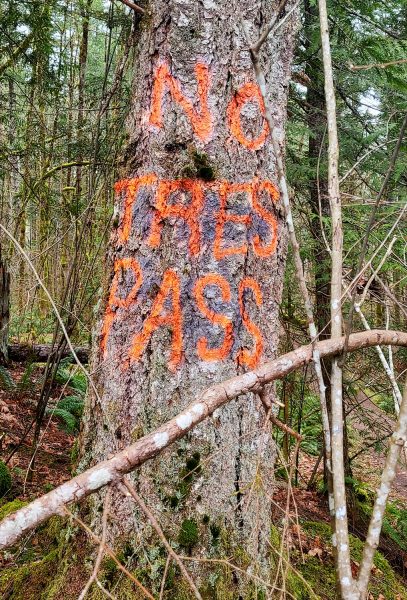Sharing the Wild

People thrive when they have easy access to wilderness experiences. Large tracts of undeveloped public land – such as the trails in Cumberland, along the Puntledge River, the North East Woods in Comox or Strathcona Park are essential. These places are not far from where you live but there are no roads, houses and cars – the trees or mountains may completely surround you. They are homes for various birds and other animals and help us imagine what our particular bioregion would look like if undeveloped.
When I am mountain biking, running or walking the same areas over and over – on different days with different people during different periods of my life – I start to create memories with the land. A place becomes an entity I am familiar with and form a bond to, like a friend. I know where significant trees and stumps are, when the fawn lilies are arriving, where the chanterelles may be hiding, the moods of a river and how weather sets the scene. Fostering a connection to wild areas is important for my feelings of groundedness and putting my life in perspective.
This year access to areas I have visited regularly for 20 years (along the pipeline and near Stotan Falls) has been blocked by big red words: “Absolutely No Trespassing”, “Private” and “Trespassers will be Prosecuted”. Even though these signs are often intended to keep people safe (because of construction: penstock recoating or laying the deep water intake pipe), it does make you think about how the places you grow to love may easily be altered, turned private or overused by us as the population grows and less areas are available.
Land is slowly being chipped away, our town edges pushing farther and farther into the wild. This all can happen in an almost imperceptible way until places look vastly different than they did just a few years before. We have to be careful that our connection to the land isn’t being chipped away at the same time.
Through COVID more of the population has begun relying on wild areas than ever before. People start feeling close to the places they frequent and want to take care of them – even if it is simply so they have a place to go biking with their family or somewhere to fish and kayak. This increased traffic in the wilderness may be a good thing. An awareness of the importance of large public wild areas will determine the quality of our lives into the future. People may demand from governments and decision makers to protect or expand greenways, parks and access to trails. The more places we protect, the more we safeguard our chances to continue connecting with our heritage and our true selves.
